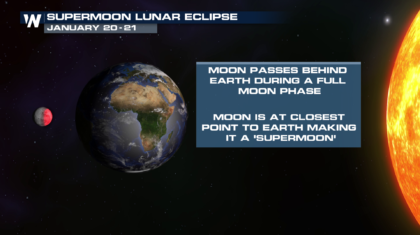Don't Miss the Supermoon Lunar Eclipse
Top Stories
20 Jan 2019 3:59 PM
The only total lunar eclipse of 2019 is January 20th-21st. Millions of folks across the western hemisphere will get to see the lunar show starting late Sunday night. While the eclipse will be visible in all of North and South America, sky conditions will determine if you get to see it.
https://gph.is/2CAQ0qn
Lunar eclipses occur at times of syzygy, meaning the Sun, the Earth, and the Moon are roughly in a straight-line. The moon will pass through the Earth's shadow Sunday night. During a total eclipse, the only light that reaches the surface is scattered through the Earth's atmosphere. The red wavelengths of light are able to reach the Moon and give it a red-orange tint. This is why a total lunar eclipse is often referred to as a Blood Moon.
 Tonight is not only a total lunar eclipse, but the moon will also appear bigger and brighter. The moon is at its closest point of orbit to Earth making it a Supermoon. The January Full Moon can also be referred to as the Wolf Moon, named after howling wolves.
You don't need any equipment or eye protection to view the lunar eclipse.
You don't want to miss it! The next total lunar eclipse is not until 2021.
Tonight is not only a total lunar eclipse, but the moon will also appear bigger and brighter. The moon is at its closest point of orbit to Earth making it a Supermoon. The January Full Moon can also be referred to as the Wolf Moon, named after howling wolves.
You don't need any equipment or eye protection to view the lunar eclipse.
You don't want to miss it! The next total lunar eclipse is not until 2021.
 Tonight is not only a total lunar eclipse, but the moon will also appear bigger and brighter. The moon is at its closest point of orbit to Earth making it a Supermoon. The January Full Moon can also be referred to as the Wolf Moon, named after howling wolves.
You don't need any equipment or eye protection to view the lunar eclipse.
You don't want to miss it! The next total lunar eclipse is not until 2021.
Tonight is not only a total lunar eclipse, but the moon will also appear bigger and brighter. The moon is at its closest point of orbit to Earth making it a Supermoon. The January Full Moon can also be referred to as the Wolf Moon, named after howling wolves.
You don't need any equipment or eye protection to view the lunar eclipse.
You don't want to miss it! The next total lunar eclipse is not until 2021.All Weather News
More